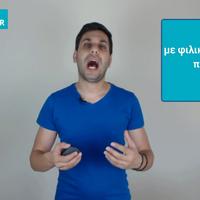Learn the Greek language: 3 ways to use the word ''πρόσωπο''
Lernen Sie die griechische Sprache: 3 Möglichkeiten, das Wort '' πρόσωπο '' zu verwenden
Learn the Greek language: 3 ways to use the word ''person''
Apprendre la langue grecque : 3 façons d'utiliser le mot ''πρόσωπο''
Aprender a língua grega: 3 maneiras de usar a palavra ''πρόσωπο''
Γεια σας! Καλώς ορίσατε και αυτή τη βδομάδα! Στο σημερινό μάθημα, θα δούμε τρεις χρήσεις της λέξης «πρόσωπο».
Hallo! Willkommen auch diese Woche! In der heutigen Lektion werden wir uns drei Verwendungen des Wortes „Gesicht“ ansehen.
Hello! Welcome this week too! In today's lesson, we will see three uses of the word "face".
Bonjour! Bienvenue à cette semaine aussi ! Dans la leçon d'aujourd'hui, nous examinerons trois utilisations du mot "personne".
Το «πρόσωπο» έχει διάφορες χρήσεις στα ελληνικά και χρησιμοποιείται πολύ στην Ελλάδα.
Das Wort "Person" hat im Griechischen verschiedene Verwendungen und wird in Griechenland sehr häufig verwendet.
The "person" has various uses in Greek and is widely used in Greece.
"Visage" a diverses utilisations en grec et est beaucoup utilisé en Grèce.
Πάμε λοιπόν να δούμε πώς να το χρησιμοποιείτε;
Mal sehen, wie man es benutzt?
So let's see how to use it?
Καταρχήν η κυριολεκτική έννοια αυτής της λέξης αναφέρεται στο μπροστινό μέρος του κεφαλιού μας.
Zunächst bezieht sich die wörtliche Bedeutung dieses Wortes auf die Vorderseite unseres Kopfes.
First of all, the literal meaning of this word refers to the front of our head.
Εκεί όπου είναι τα μάτια, το στόμα και η μύτη μας.
Wo unsere Augen, Mund und Nase sind.
Where our eyes, mouth and nose are.
Έτσι έχουμε τις κρέμες προσώπου, δηλαδή τις κρέμες που βάζουμε στο πρόσωπό μας.
Wir haben also die Gesichtscremes, dh die Cremes, die wir auf unser Gesicht auftragen.
So we have the face creams, that is the creams we put on our face.
Πάμε όμως να δούμε και τρεις άλλες χρήσεις αυτής της λέξης.
Aber schauen wir uns drei andere Verwendungen dieses Wortes an.
But let's look at three other uses of this word.
Πολλές φορές στην Ελλάδα θα ακούσετε ότι υπάρχουν προβλήματα στις σχέσεις με «φιλικά ή συγγενικά πρόσωπα».
In Griechenland werden Sie oft hören, dass es Probleme mit Beziehungen zu "Freunden oder Verwandten" gibt.
Many times in Greece you will hear that there are problems with relationships with "friendly or relatives".
Δηλαδή, υπάρχουν προβλήματα με συγκεκριμένους ανθρώπους από το φιλικό ή συγγενικό περιβάλλον.
Das heißt, es gibt Probleme mit bestimmten Personen aus einem freundlichen oder familiären Umfeld.
That is, there are problems with specific people from the friendly or family environment.
Επομένως, η λέξη αυτή μπορεί να μεταφραστεί και ως άτομο ή άνθρωπος.
Daher kann dieses Wort auch als Individuum oder als Mensch übersetzt werden.
Therefore, this word can also be translated as an individual or a person.
Επίσης, όταν αναφερόμαστε στους χαρακτήρες μιας ταινίας ή ενός βιβλίου λέμε «τα πρόσωπα του βιβλίου είναι περίεργα»
Wenn wir über die Charaktere in einem Film oder einem Buch sprechen, sagen wir auch: "Die Gesichter in dem Buch sind komisch."
Also, when referring to the characters of a movie or book, we say "the faces of the book are strange"
ή «η ταινία έχει πολλά πρόσωπα που δεν έχουν κανένα ρόλο στην εξέλιξη της υπόθεσης».
oder "Der Film hat viele Gesichter, die für die Entwicklung des Falls keine Rolle spielen."
or "the film has many people who have no role in the evolution of the case."
Εδώ λοιπόν, με τη λέξη πρόσωπο εννοούμε τους χαρακτήρες των βιβλίων και των ταινιών.
Hier meinen wir also mit dem Wort Gesicht die Charaktere aus Büchern und Filmen.
Here, with the word person, we mean the characters of the books and films.
Τέλος, πολλοί λένε «ήρθα πρόσωπο με πρόσωπο με τον πρώην άντρα μου» εννοώντας ότι ήρθα πολύ κοντά,
Schließlich sagen viele "Ich bin meinem Ex-Mann von Angesicht zu Angesicht begegnet", was bedeutet, dass ich sehr nahe gekommen bin,
Finally, many say "I came face to face with my ex-husband" meaning I came very close,
Sonunda, birçok kişi "eski kocamla yüz yüze geldim" diyor
τον είδα από πολύ κοντά ενώ ίσως δεν ήθελα.
Ich habe ihn sehr genau gesehen und wollte es vielleicht nicht.
I saw him very close and maybe I did not want to.
Onu çok yakın gördüm ve belki istemedim.
Μπορείτε επίσης να πείτε ότι όταν έχω προβλήματα με κάποιον μου αρέσει να έρχομαι «πρόσωπο με πρόσωπο» μαζί του και να του τα λέω.
Sie können auch sagen, wenn ich Probleme mit jemandem habe, möchte ich ihm "von Angesicht zu Angesicht" begegnen und es ihm sagen.
You can also say that when I have problems with someone I like to come face to face with him and tell him.
Ayrıca biriyle sorun yaşadığımda onunla yüz yüze gelip ona anlatmayı sevdiğimi de söyleyebilirsiniz.
Αυτά για σήμερα, ελπίζω να σας βοήθησε αυτό το μάθημα και να μάθατε κάτι ακόμη στα ελληνικά. Γεια σας και καλή εβδομάδα. Τα λέμε...
Ich hoffe, diese Lektion hat Ihnen geholfen und Sie haben etwas mehr auf Griechisch gelernt. Hallo und eine schöne Woche. Wir sehen uns ...
For today, I hope you helped this lesson and learned something else in Greek. Hello and good week. See you...

